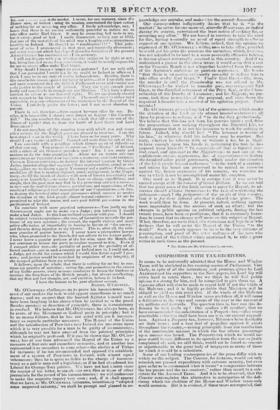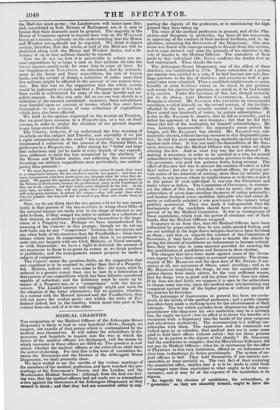COMPROMISE WITH TAX-RECEIVERS. • Ia seems to be universally admitted
that the House and Window Taxes will be abolished in the ensuing session of Parliament. Very likely, in spite of all the intimations and promises given bylsord .1deenoan and his supporters in the Newspepers, his Lord hip will strive hard to retain them , but we think he will fiad public opinion tco strong for him, and be compelled to give them up. A vigorous effort will also be made to repeal half if not the whole of the Malt-tax ; and it is highly probable that Ministers will be obliged to yieM on this point also. If the whole of the Malt-tax as well as the fieuse and Window taxes are taken off, it will cause a defalcation in the ways and means of the year to the amount of six millions and upwards. The question then is, how can this deficiency be beet made up ? Our readers will ratolleca that we have rm.:minim:deal the substitution of a Property-tax—after every practicable reduction shall have been male hi our annual expenditure. Against a Property-tax, however, Miuisters havealeeidedly set their faces ; and a vast deal of prejudice against it exists throughout. the country,—arising principally from the recollection of the insufierahle manner in which the last odious peecentage upon income was levied. The Property-tax which we would impose would le: very different in its operation from the one so justly complained of; and, we still think, would not be found so onerous or objectionable to the great body of taxpayers as many of those for which it would be a substitute.
Some of our leading contemporaries of the press differ with us widely on this subject. The Co/trier, for instance, would not only retrench our present expenditure with extreme severity, but even goes so far as to recommend what it terms" a compromise between the tax-payers and the tax-receivers," rather than resort to a substitute for the Assessed Taxes. And it is to he observed, that the Courier contemplates this alternative in anticipation of the deficiency which the abolition of the House and Window taxes only would occasion. Butt it is evident, if these taxes are repealed, that the Malt-tax must go too : the Landowners will insist upon this; and, constituted as both Houses of Parliament are, it is easy to foresee that their demands must be granted. The majority in the House of Commons agreed to rescind their vote on Sir WiLnissa INGILBY'S motion, expressly on the understanding that the House and Window taxesohould not be repealed. We think it almost certain, therefore, that the whole, or half of the Malt-tax will be abolished along with the House and Window duties, and a deficiency of six or four millions thereby be created. Now we do not see how it is practicable to reduce our annual expenditure by so large a sum as four millions (to take the lowest amount mentioned), for some time to come at least. In our Supplement on TAXATION, we calculated, that by retrenchment in the Army and Navy expenditure, the sale of Crown lands, and the revisal of duties, a reduction of rather more than five millions might be effected in the amount of our annual taxation. But this was on the supposition that the whole system would be judiciously revised, and that a Property-tax of five millions would be substituted for some of the more hurtful and impolitic imposts. In this way only did we see our way clearly to a reduction of the amount mentioned : Moreover, these calculations were founded upon an amount of income which has since been diminished—to say nothing of some reductions of expenditure -which have also been effected.
We hold to the opinion expressed in the treatise on Taxation, that we must have recourse to a Property-tax, or a tax on fixed income, in order to render the abolition of our present imposts to any large extent feasible. The Courier, however, if we understand the true meaning of its article on this subject last Tuesday, and especially if we put • a right interpretation on the word " tax-receivers," is prepared to recommend a reduction of the interest of the National Debt, in preference to a Property-tax. After stating his "belief and hope that reductions may yet be made in every branch of our expenditure, sufficient to meet the loss occasioned by the abolition" of the House and Window duties, and enforcing the necessity of lessening our military expenditure more particularly, our contemporary thus proceeds— c, We must, however, repeat, that if reductions cannot be made, there must be a compromise between the tax-receivers and the tax-payers ; and there are many tax-receivers who have never given any adequate value for what they obtained. We ground this opinion on the single fact, that the tax-payers have, by the Reform in Parliament, become the predominant party in the Legislature as they are in the country, and their wishes must ultimately be the law. At the same time, we believe they' will act justly—that if any necessity arises they will make great exertions to defend the country—they will make them when they are wanted—bat they will not be taxed to pay those who render them no services."
Now, we do not think that the tax-payers will act by any means justly to that portion of the tax-receivers to whom three-fifths of the national income are made over in the shape of interest on our debt to them, if they compel the latter to submit to a reduction of that interest, in preference to submitting themselves to the imposition of a Property-tax. Perhaps we have misunderstood the meaning of the Courier in this passage; though we do not see how there can be any "compromise" between the tax-payers and any other body of tax-receivers than the Fundholders : these have claims which may be compromised ; but there is no occasion to enter into any bargain with our Civil, Military, or Naval servants, or with Sinecurists : we have a right to diminish the amount of our payments to them to as great an extent as we think prudent or justifiable; and the arrangement cannot properly be made a subject of compromise. The Courier states the question fairly, on the supposition that any expedient is to be resorted to, rather than that of a Propertytax. Matters, indeed, will soon come to this : the taxes must be reduced to a greater extent than can be met by a diminution of that portion of our expenditure which has been hitherto considered capable of reduction; and the deficiency must be made up by means of a Property-tax, or a "compromise" with the tax-receivers. The Landed interest will struggle might and main for the adoption of the latter alternative; but we question whether, in a contest with the Monied interest and the Fundholders, they will not prove the weaker party—not within the walls of Parliament indeed, but in the country, which must take part in the contest from one end of it to the other.





















 Previous page
Previous page